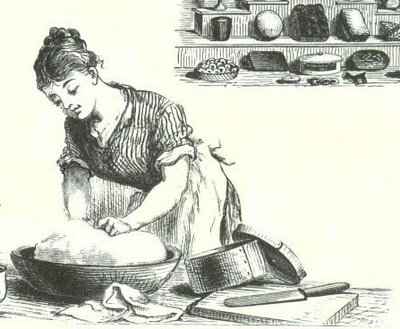שפּריכװערטער װעגן ברויט און פֿרויען בײַ ײדן

װען אַ קאָלעגין האָט מיר געזאָגט אַז זי טוט איצטער פֿאָרשונג װעגן ברױט און פֿרױען בײַ חז"ל, האָב איך זיך דערמאָנט אַז בײַ ייִדן װערן פֿרױען און ברױט אַ מאָל פֿאַרגליכן. בײַ בערנשטײנען האָב איך געפֿונען די פֿאָלגנדיקע שפּריכװערטער׃
מען טאָר ניט עסן די חלה פֿאַר דער המוציא.
You mustn’t eat khale before the “hamotsi”
It is not good to make a “hamotsi” over a khale that has already been started.
װאָס טוט מײַן כּלה? זי קנײט זיצנדיק חלה.
What is my kale doing? Sitting kneading khale.
אַן אויסגעגעבענע טאָכטער איז װי אַן אָפּגעשניטן שטיקל ברויט (זי קאָן זיך מער ניט צוריק צוקלעפּן צו די עלטערן).
A daughter who has been married off is like a piece of bread that has been sliced off (She can no more return to her family than the slice can get stuck back on the loaf).
די ליבע איז זיס, נאָר זי איז גוט מיט ברויט.
Love is sweet, but good with bread.
Among the proverbs collected by Ignatz Bernshteyn in Yidishe shprikhverter un rednsartn (












6 Comments:
זעט רש"י אין בראשית ל"ט פסוק ו´ אַז לחם איז אַ מעטאַפאָר פאַר אַ ווייב.
I don't know any bread proverbs, but one you probably know that will go well with a good bread is this. When my dad is not feeling well he reverts to chicken noodle soup (doesn't everyone?) and announces what his mother taught him: Troubles are easier to take with soup than without. Unfortunately I don't speak Yiddish and can't write this in Hebrew.
ש'כּח, קטלא קניא
איך האָב געהאַט דעם רש"י אין זין,
(און אױך כּתּובות 62ב׃ דער װאָס האָט ברױט אין קױש איז נישט װי דער װאָס האָט נישט קײן ברױט אין קױש)
אָבער איך בין געװען צו פֿױל דעם אנצובלאָגעװען, װעט עס װערן אַ בלאָג-אײנס פֿאַר זיך
Hi Trig,
I think I've heard this one:
בעסער צרות מיט יױך אײדער צרות אָן יױך
"beser tsures mit yoykh eyder tsures on yoykh"
better trouble with soup than trouble without soup.
About the kale who kneads khale sitting down. That's the sign of a lazy woman. (A similar expression is "Zi zitzt un volgert lokshen" Translation She sits and rolls out noodles. Inference--a lazy and inept housewife.) You can't roll out noodle dough or knead dough well unless you stand and "put your back into it" so to speak.
There's a whole genre of little "tests" for a kale-moyd: you're probably familiar with the ones about untangling yarn or undoing a knot, tests of patience, persistence and good humor that I'd fail. I suspect that many a young woman kneaded and rolled out dough under the critical eye of her prospective mother-in-law. (Nisht far unz gedakht.)
זיי אויך רש"י אויף שמות פרק בּ, פסוק כ..
יִישר־כּח
Post a Comment
<< Home